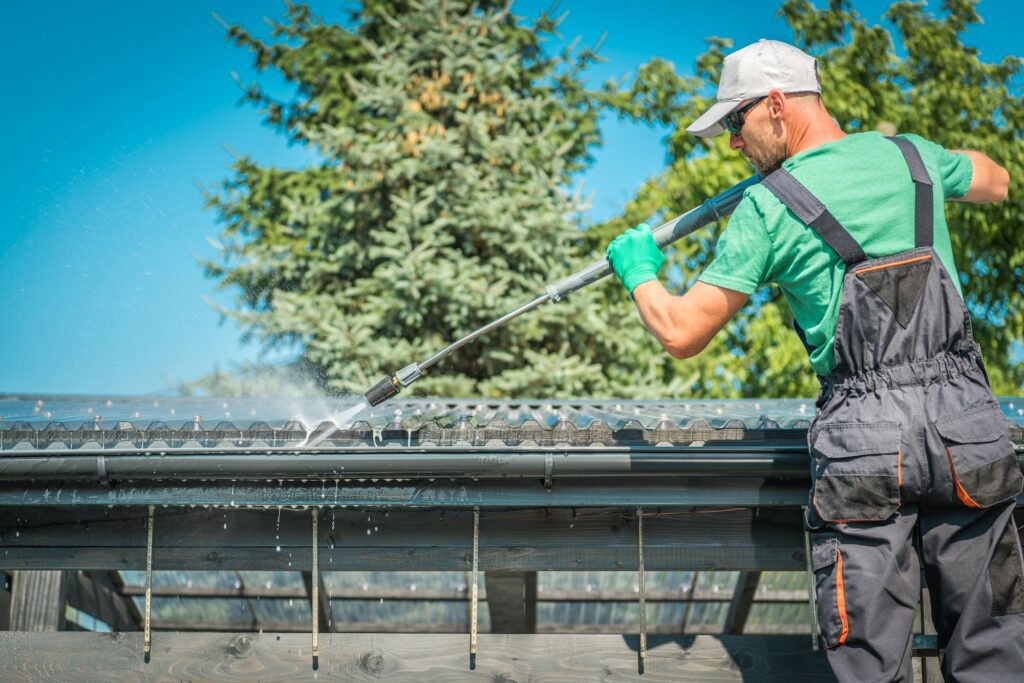Rain gutters are an important part of your home’s exterior. They help to direct water away from your foundation, walls, and roof, preventing water damage and keeping your home safe and dry. However, if your rain gutters become clogged with debris, they can’t do their job properly, which can lead to water damage and costly repairs. In this article, we will provide you with 8 DIY rain gutter cleaning tips to help you keep your home safe and dry.
Safety First
Before you start cleaning your rain gutters, it’s important to prioritize safety. Wear sturdy work gloves to protect your hands from sharp debris, and consider using a stabilizer or ladder leveler to prevent your ladder from slipping. Always have someone hold the ladder steady while you climb up, wear sturdy shoes with good traction, and consider wearing safety equipment such as gloves and eye protection.
Use a Scoop or Trowel
A scoop or trowel can be an effective tool for removing debris from your rain gutters. Use a plastic scoop or trowel to avoid damaging your gutters, and be sure to deposit the debris into a bucket or bag for disposal. Using a specialized gutter scoop or small trowel can make the process of removing debris from your gutters easier and more efficient. Be sure to dispose of the debris in a proper manner.
Blast Away Debris with a Power Washer
If you have a power washer, it can be a great tool for cleaning your rain gutters. Use a low-pressure setting to blast away leaves, twigs, and other debris. Just be sure to hold the wand at a 45-degree angle to avoid damaging your gutters. Using a power washer can help remove stubborn debris from your gutters. However, be sure to use caution and not apply too much pressure, which can damage your gutters.
Check Your Downspouts
After you’ve cleaned out your rain gutters, it’s important to check your downspouts. Use a hose to flush out any remaining debris, and make sure the water is flowing freely. If your downspouts are clogged, you may need to use a plumber’s snake or a high-pressure washer to clear the blockage. In addition to cleaning your gutters, it’s important to also check your downspouts for any clogs or blockages. You can use a plumber’s snake or a garden hose to clear any debris.
Trim Overhanging Trees
Overhanging trees can drop leaves, twigs, and other debris onto your rain gutters, causing them to become clogged. If you have trees near your home, consider trimming back the branches to reduce the amount of debris that falls onto your roof and gutters. Overhanging branches and foliage can deposit leaves and other debris into your gutters. Regularly trimming back these trees can help reduce the amount of debris that collects in your gutters.
Install Gutter Guards
Gutter guards can be a great investment for homeowners who want to minimize the amount of debris that collects in their rain gutters. There are many different types of gutter guards available, including mesh screens, foam inserts, and brush guards. Talk to a professional gutter installer to find the best option for your home. Gutter guards are designed to prevent debris from entering your gutters, while still allowing rainwater to flow freely. There are many different types of gutter guards available, including screens, filters, and mesh covers.
Schedule Regular Cleaning and Maintenance
Regular cleaning and maintenance can help you avoid costly repairs and water damage to your home. Schedule a professional gutter cleaning at least twice a year, and consider installing gutter guards to make cleaning easier. Regularly cleaning and maintaining your gutters can help prevent clogs, leaks, and other issues. It’s recommended that you clean your gutters at least twice a year, or more frequently if you live in an area with heavy foliage.
Consider Professional Installation
If your rain gutters are old, damaged, or not functioning properly, it may be time to consider professional installation. A professional installer can help you choose the right type of rain gutters for your home, and ensure they are installed correctly for maximum performance and durability. If you’re not comfortable cleaning your gutters yourself, or if you have a particularly large or complex gutter system, it may be worth considering professional installation and maintenance services. A professional can ensure that your gutters are properly installed and maintained, helping to extend their lifespan and prevent costly repairs down the line.
Rain Gutter Cleaning and Maintenance
Regular rain gutter cleaning and maintenance is essential for keeping your home safe and dry. By following these 8 DIY rain gutter cleaning tips, you can help prevent water damage and costly repairs. Remember to prioritize safety, and consider hiring a professional installer or scheduling regular cleanings to keep your rain gutters in top condition.








